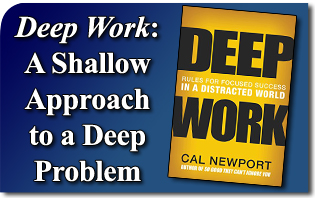 There are many books that discuss the harmful effects of cyber distractions upon society and the individual. Such works offer compelling arguments that contribute to the growing skepticism in the general public about our relationships to our machines. Unfortunately, Cal Newport’s Deep Work: Rules for Focused Success in a Distracted World is not one of these books.
There are many books that discuss the harmful effects of cyber distractions upon society and the individual. Such works offer compelling arguments that contribute to the growing skepticism in the general public about our relationships to our machines. Unfortunately, Cal Newport’s Deep Work: Rules for Focused Success in a Distracted World is not one of these books.
In all fairness, it must be said that Newport never intended his book to be a broadside against Internet obsessions. The Georgetown assistant professor clearly states that he takes no position in the philosophical debate as to whether online distractions are good or bad. All he wants to do is declare “a pragmatic recognition that the ability to concentrate is a skill that gets valuable things done.”
Thus, the book is what he says it is: a treatise on the benefits of concentration. Newport stays laser-focused on his topic, turning what could be a fascinating and scathing commentary on postmodern behavior, into a how-to manual on getting ahead by singleminded determination.
His topic is “deep work,” which Newport defines as the “professional activities performed in a state of distraction-free concentration that push your cognitive capacity to their limit.” He then proves how deep work is valuable, rare, and meaningful, in much the same way that someone might describe the benefits of weightlifting.
Newport cannot be faulted for delivering what he promises. However, the title Deep Work leads the reader to expect a more profound analysis of today’s distracted world. The book’s appeal is found in the context of distraction rather than the allure of concentration. By avoiding controversy, the author hollows out the debate, taking a shallow approach to a deep topic.
Indeed, a deep discussion on this matter is much needed. The problems of Internet addiction and constant distraction are on everyone’s mind. It is affecting social skills, workplace productivity, and relationships. People are clamoring for an understanding of what went wrong. Thus, the reader wants more and perceives there is much more material to explore than that which Newport chooses to develop.
Of course, Newport cannot avoid the debate entirely. To the degree that he enters into concepts touching upon the meaning and purpose in life, he does offer some fascinating insights that can provoke deep thought.
His criticism of Descartes’ skepticism, for example, describes the creation of a shallow world of uncertainty that “stripped the world of the order and sacredness essential to creating meaning.” He decries the practice of the autonomous individual who alone determines what is meaningful and what is not, as an open door to a “creeping nihilism.” He prescribes deep work in the form of traditional craftsmanship as one way to return to meaning and avoid a “boring,” “unlivable” life.
One can appreciate Newport’s understanding of the workings of the human mind when he touches upon how a person reaches fulfillment when stretched to the limits of doing something difficult and worthwhile. He is quick to point out the value of true leisure in providing balance in a person’s life and opportunities to meditate and ruminate over problems.
These existential insights, however, are rare and almost accidental. He always returns to his pragmatic core. The second part of the book consists of the practical rules for cultivating deep work by avoiding excessive distractions in an Internet age. He urges readers to quit unnecessary social media since they are “engineered to be addictive — robbing time and attention from activities that more directly support your professional and personal goals.”
Such rules are well thought out and useful. However, they can be a bit too mechanical when, for example, he ardently promotes certain methods that worked for him such as scheduling every minute of the day. He even admits that he may have taken his methods to the extreme by turning himself into “a deep work machine.”
Newport’s shallow approach makes it easy to consider his work just one more quit-clicking start-working pep talk. It can provide some momentary inspiration with its account of the journey of one superhuman man and a yes-you-can-do-it-too commentary.
However, it does not answer the deeper spiritual question: why are people distracted and unable to concentrate? Thus, his book easily risks becoming a distraction itself — a kind of pit stop of radical methods that people can talk about before going back to their daily Internet and social media fixes.
As seen on American Thinker.

